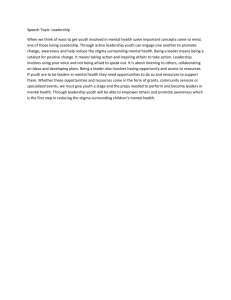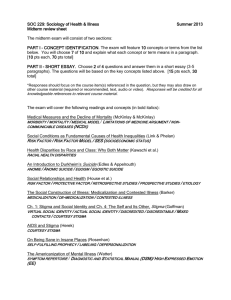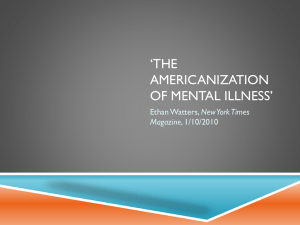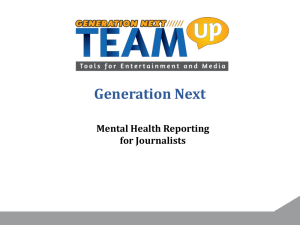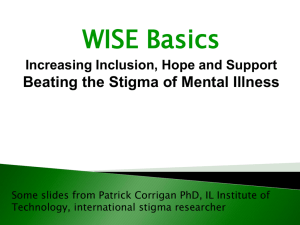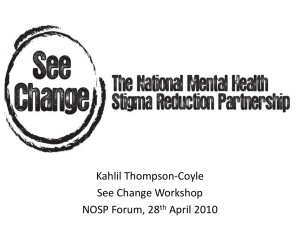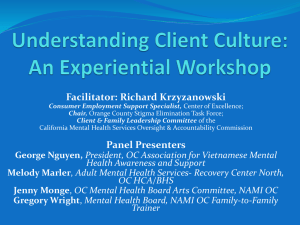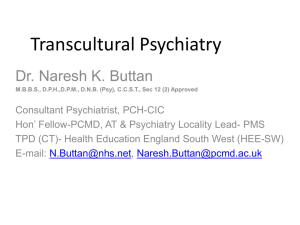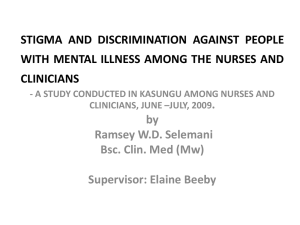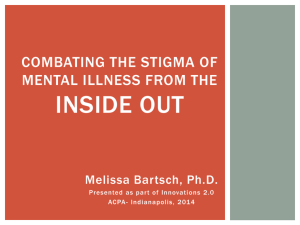Dr Maggie McGurgan PowerPoint
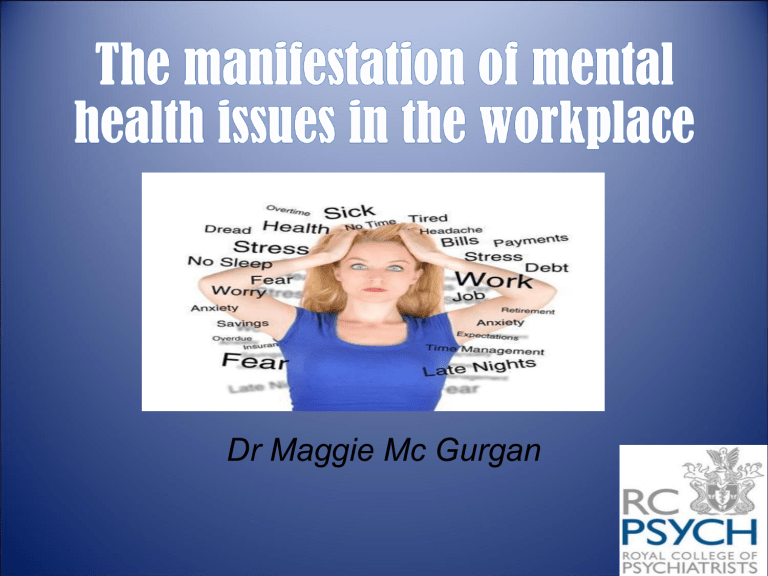
Dr Maggie Mc Gurgan
‘Businesses that don’t take mental health seriously will not be successful…….the capabilities that companies require now centre more on innovation, communication & emotional intelligence than just the more straightforward requirements of strength, dexterity & intellect that characterised previous eras.’
- Dr Paul Litchfield
• 3/10 employees will have a mental health problem of some sort in any one year
Outline
What is
Mental Health
?
What is
Mental Health
?
What is
Mental Health
?
•
What is
HEALTH
?
No health without mental health
.
What is Health?
• Physical Health
How our bodies are
Having a healthy body is really important
Keeping fit
Eating well
Adequate sleep
Stress management
What is Health?
• Mental Health
How our minds are
Thoughts, feelings, emotions & behaviours
Having a healthy mind is just as important as having a healthy body
Can’t ever properly have one without the other!
The same things that keep our bodies healthy also keep our minds healthy
Stress
vs
Mental Illness
• Distinction between ‘pressure’,
‘stress’ & ‘mental health problems’
• Everyone feels under pressure sometimes but not everyone suffers the adverse effects of stress or a mental health problem
• One persons ‘spur to action’ is another’s nightmare & cause of
‘melt down’
• Ability to work under pressure varies according to what is happening in rest of one’s life
Stress
vs
Mental Illness
• Educate staff about stress
• Encourage discussion
• Raise awareness
• Use resources appropriate to your service
Mental Health Problems-
The Facts:
• Extremely common in
• These kinds of illnesses therefore rank alongside cardiovascular disorders and cancer as among the nation's biggest health problems .
Mental Health Problems-
The Facts:
• Can take many forms including – severe stress, depression, bipolar affective disorder, schizophrenia, eating disorders, anxieties, phobias, obsessive compulsive disorder, drug and alcohol abuse, post-traumatic stress disorder, complex bereavement and dementia.
• These are issues which could affect any one of us.
Mental Health Problems-
The Facts:
• Named conditions – be informed!
• http://www.rcpsych.ac.uk/mentalhealthinfor mation.aspx
Mental Health Problems-
The Facts:
• People feel very uncomfortable talking about mental health
• A reason for this is stigma
• People with mental illness can be stereotyped and discriminated against
• By ridiculing someone we create a barrier that makes us think we aren’t like that person.
• We want to believe ‘ that could never be me ’ .
• For some people the impact of stigma is worse than the symptoms of their illness.
• We are frightened of mental illness in a way that we are not about physical illness.
Mental Health Problems-
The Facts:
• Psychiatrists are all too aware of the issue of stigma. It affects every sphere of our work.
• It makes people reluctant to admit that they are struggling with mental health difficulties and this can delay treatment and support.
• We are aware of how people ’ s recovery can be held back by the barriers that stigma creates, often through problems encountered at work.
• To reduce stigma and discrimination we need much better education .
• Teaching people the facts about mental health problems and getting rid of the myths.
Mental Health Problems-
The Facts:
• ALL mental health problems can be helped by:
– Support
– Talking Therapies
– Medications
• The prognosis for the vast majority of conditions is very positive with the right help
• In most cases, even those with long term conditions can be supported to lead full & productive lives including employment.
Schizo, psycho, nutter, freak;
Crazy, loser, loner, geek.
Mental, oddball, spacer, mad;
Loony, bonkers, dangerous, bad.
Wacko, threat, capable of killing;
Insane, scary, not the full shilling.
Animal, maniac, wrong in the head;
Violent, evil…better off dead.
• Diabetes
• Epilepsy
• Asthma…….
______________________
• Depression
• Alcoholism
• Schizophrenia
Stigma?
• Diabetes
• Epilepsy
• Asthma…….
• Depression
• Alcoholism
• Schizophrenia
Stigma?
Warning Signs
• An increase in unexplained absences or sick leave.
• Poor performance .
• Poortime-keeping .
• Increased use of alcohol, drugs, tobacco or caffeine .
• Frequent headaches and backaches .
• Withdrawal from social contact .
• Poor judgement / indecision .
• Constant tiredness or low energy .
• Unusual displays of emotion , e.g. frequent irritability or tearfulness.
Warning Signs
• Working slowly
• Missing deadlines
• Difficulty concentrating
• Appearing numb or emotionless
• Withdrawing from work activity
• Over working
• Forgetting directives, procedures and requests
• Having difficulty with work transitions or changes in routines
Mental Health Issues in the
Workplace
• Be vigilant in the same way as you would for any health issues
• Don’t be afraid to ask
How to help
1. Be mental health aware
2. Good practices will be good mental health practices
3. Promote a culture of parity of esteem
How to help
• Encourage access to:
Staff Support services
Occupational health
GP
Voluntary Support
Agencies
*As appropriate
Promote
Resilience
&
Recovery
• Employment can be a key part of both
• Work is a major part of our lives.
• It is where we spend much of our time, where we may have most contact with other people, where we make our money and where we sometimes make our friends .
• Having a fulfilling job is good for your mental health and general wellbeing.
How to help
How to help
• Be aware of your own negative stereo-types & stigmatising attitudes
• Seek further advice & information as needed
• Stop. Think.
Understand.
Support .
Resources
• http://www.rcpsych.ac.uk/usefulres ources/workandmentalhealth/empl oyer.aspx
• http://www.rcpsych.ac.uk/usefulres ources/publications/books/rcpp/190
1242854.aspx
• http://www.rcpsych.ac.uk/healthadv ice/moreinformation/aboutourleafle ts.aspx
Resources
• www.amh.org.uk/
• http://www.hse.gov.uk/st ress/furtheradvice/stressa ndmentalhealth.htm
• http://www.health4work.
nhs.uk/mental_health_in
_the_work_place/questio n_2
Resources
• http://www.mentalhealth.org.
uk/our-work/policy/physicalhealth-and-mental-health/
• http://www.hse.gov.uk/stress/ pdfs/manage-mentalhealth.pdf
• ‘‘All organisations say routinely ‘People are our greatest asset’ . Yet few practice what they preach, let alone truly believe it’’
– Peter Drucker

